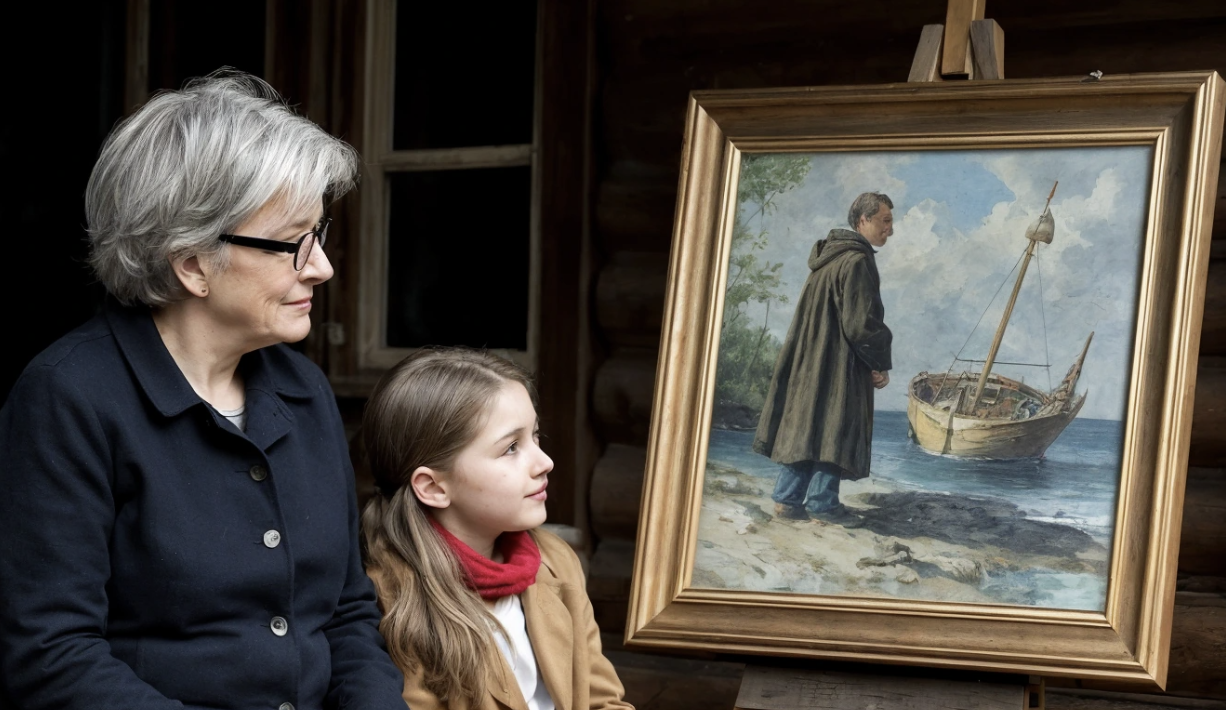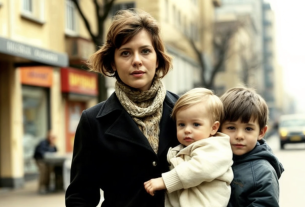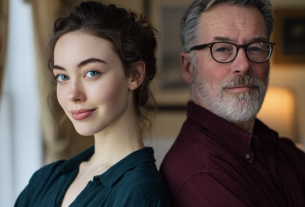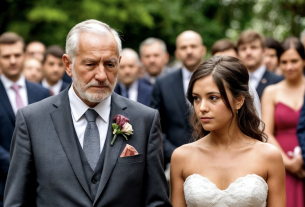After the death of her mother-in-law, Valentina arrived at the notary’s office where the reading of the will was to take place. The building was familiar to her — old, with a cracked sign and massive doors behind which there was always the smell of dust, wood, and paper.
Valya was the first to arrive. Dressed in a black coat, she maintained an outward calm — as usual. Her mother-in-law had been a strict woman, but Valya had respected her. The last years of illness had brought them closer: Valya was the one who cared for the old woman, took her to doctors, cooked meals, and endured her irritability and forgetfulness. Andrey, her husband, had grown distant. He left more often, stayed late at work, becoming almost a stranger to her.
Ten minutes later, he entered the room — Andrey. But not alone.
Next to him walked a young woman of about thirty — neat hairstyle, stylish handbag. She was holding a child, a boy about five years old. The boy clung tightly to his mother. Valya froze.
“What is this performance?” she asked calmly, looking directly into her ex-husband’s eyes.
Andrey remained silent. The woman only slightly nodded and took a seat nearby. The child looked at Valya curiously.
The notary entered the room. He greeted them, sat at the table, and opened a folder:
“We have gathered here to read the will of Maria Petrovna Ivanova…”
While he read, Valya still could not grasp what was happening. Before her was the very woman about whom rumors had circulated, but Valya preferred not to believe. Or simply didn’t want to.
“According to the deceased’s will, the apartment and bank accounts pass into the ownership of Valentina Sergeevna Ivanova,” the notary continued.
A pause. All eyes turned to Valya. She was silent.
“However, there is one more condition,” added the notary. “Maria Petrovna requested that the dacha in the village of Glinino and the family jewelry, kept in the safe, be passed to her grandson — Petr Andreevich — on one condition: he must be officially recognized as the son of Andrey Ivanov.”
The room went silent. Only the child cautiously asked:
“Mom, who is this auntie?”
Valya slowly stood up.
“I am the one who held this family together for many years. And now, apparently, I am free.”
She left without looking back. Rain began outside the window. Raising the collar of her coat, Valya inhaled the cold air and felt not pain, but a strange lightness. It was over. Or only just beginning.
Valya spent the way home in silence. Raindrops ran down the window; the notary’s words spun in her mind. The apartment, the money — it all felt foreign. The mother-in-law knew everything: about the child, about the betrayal. But kept silent until the very end. And now she left a message — the dacha and jewelry to the illegitimate grandson. It was not just a gift — it was a statement.
Valya returned to the empty apartment. It used to smell of coffee, pies, cologne… Now — only dust and silence. She took off her coat, brewed tea, and sat by the window. What now? Sell everything? Leave? Stay alone?
The phone vibrated. A message from an unknown number:
“Hello. This is Marina. I would like to talk. No scandals. For Petya’s sake.”
Marina. The mistress. The mother of his child. Valya stared at the screen for a long time. She replied:
“Tomorrow. 12:00. Cafe ‘Old Town.’ Without Andrey.”
The next day they met. Marina looked tense but held herself confidently. In her hands — a photo album with pictures of Petya: first steps, school morning performances, children’s drawings. Valya studied the boy — he had Andrey’s features, but most of all resembled Maria Petrovna. The same eyes, the same cheekbones.
“Has he seen her?” Valya asked.
“Once. At her request. I didn’t understand why then… Now I do.”
Silence fell.
“I don’t want money,” Marina finally said. “Nor the apartment. I want Petya to have a story. So he’s not ‘the second child.’ So he is accepted.”
Valya finished her coffee. There was no anger in her chest — only a new feeling she hadn’t felt for a long time: strength. The very strength her mother-in-law had always seen in her.
“He will get his name. And his inheritance. Because he is part of this family,” Valya said. “But from this day, I am no longer part of yours.”
Already leaving the cafe, Valya felt not bitterness, but relief. Years of deceit, loneliness, and fear were behind her. Now she had not just freedom. She had a choice.
A week passed.
Valentina’s apartment came to life. She sorted things, packed boxes, threw away old items, gave away extras. What once seemed important — marriage, home comfort, stability — disappeared. But something else came in its place — a trembling, almost frightening — feeling of freedom.
Valya sat on a train heading south. The final destination was the very village by the sea where she had spent student holidays, where her youth remained, her first watercolors, and the smell of the steppe wind.
“Are you alone?” asked a fellow passenger, an elderly woman with knitting in her hands.
“Yes,” Valya replied with a smile. “Completely alone. And I don’t feel the slightest sadness about it.”
She rented a small house just five minutes from the sea. Every morning she went barefoot to the shore, walking on warm sand, holding a notebook and a set of pencils. Valya started painting again — not out of sadness or memories, but because there was so much light and space inside her. She painted landscapes, faces of passersby, old boats, and elderly people on benches. Her hand remembered every stroke.
Once, at an art gallery where Valya exhibited some of her works, an unfamiliar man appeared. Tall, with graying hair, wearing a worn jacket stained with paint. A former architect who recently moved to the sea — to restore health and find inner peace.
“Did you paint the portrait of the boatman?” he asked.
“Yes. Were you the boatman?”
“Almost. Only without the dog,” he smiled.
Thus began a slow, cautious friendship between them. No obligations, no promises. Just two people tired of their former lives who found support and meaning in each other for a new day.
One day Valya received a letter. On the envelope, in childish handwriting, was written:
“To Aunt Valya. Thank you for the little house and Grandma’s ring. I won’t give it to anyone. Now I have my own secret place under the floor! Mom says you are very brave. I want to be like you. Petya.”
Valya smiled. She put the letter in the folder with her watercolors.
Life never returned to what it was before. It became different. And for the first time in many years, it was truly her own.
Petr Andreevich Ivanov turned twenty-two.
He stood on the porch of the old house in Glinino — the very one that had passed to him by inheritance. The dacha had changed a lot: a new roof, solar panels, a renovated shed turned into a workshop. But some things remained the same — grandmother’s chest in the corner of the storeroom and a secret under the floorboard where his childhood “treasures” were still kept: a broken toy car, a subway token, and one special thing — a letter.
A letter from Valya.
He found it by chance when he was about ten. It was hidden among old albums. Written in neat handwriting, with warmth and care.
Petya.
You will probably grow up and become an adult before you understand how much there was in this world before you were born.
You had a chance to destroy everything — but you became the beginning of something new. You gave me the strength to leave and start over.
This house is yours. But you don’t have to feel bound by its walls. The main thing is not to forget that even in pain there can be light.
Don’t be afraid to leave when you understand this is no longer your path.
With love,
Valentina.
Back then he didn’t understand it all. But now — he read every line as if for the first time.
He became an artist. His exhibitions were just beginning, but one of his paintings — depicting an old man and a boat — already hung in the local gallery. He knew where this gift came from — not from his father, not from his mother. From a woman who was neither blood relative nor guardian, but who left the most important thing — a sense of dignity and kindness.
In the evening, Petya opened the window. The wind swayed the curtain. On the easel lay a blank canvas. He took a brush and began with the sky — as soft as in her watercolors.
In his heart, there was no longer childhood confusion, family secrets, or hidden resentments. Everything had fallen into place. He knew who he was. And he knew where his path began.
With one woman. With her strength. With her silence. With her departure — and one letter.
The gallery was on the outskirts of the coastal town, bathed in the scent of jasmine and sea air. Inside — soft light, wooden floor, watercolor paintings on the walls. The poster at the entrance read:
“Petr Ivanov. Lines of Memory”
This was his first major solo exhibition. The colors — warm, the shapes — soft. The sea, old houses, lonely figures in the distance. One painting stood out especially — a boat on the shore and a woman in a coat standing with her back turned. Title: “Farewell.”
When Valentina entered the hall, the room was already filled with people. But he noticed her immediately.
She had hardly changed — her hair slightly grayed, her movements more measured. Linen dress, woven bag, and a gaze — attentive, like someone who has been through a lot.
Petya approached.
“Hello, Aunt Valya,” he said quietly.
She looked at him, smiled, her eyes sparkling.
“Hello, Petya.”
He hugged her. For a long time. Not as a son, not as a grandson, but as the very boy to whom she once gave the chance to become himself.
“I found your letter,” he said. “In the secret place.”
“I hoped you would find it. But not before its time.”
“It helped me more than you think.”
They stood among voices, music, laughter. And in their little world there was silence — real, alive.
Later they sat by the sea, on the familiar bench. Petya talked about his projects, exhibitions, studio. Valya spoke about her path — about how she learned to value solitude, how not to be afraid to be alone if you are whole inside.
“You really left then forever?” he asked.
“No, Petya. I just went to myself. And left you what is more important than my presence — the chance to understand who you are. That is worth more than any care.”
He nodded and handed her an envelope.
“Now it’s my turn. Almost nothing — just words. But maybe you will find them someday… or reread them. Not before their time.”
Valya took the letter. Looking at it, she realized: the story was not over. It had become wider. Deeper. Endless.
Many years later, Petya sat on the veranda of his new house — not in Glinino, but in a place he chose himself. Light walls, large windows filled with air and sun. On his lap sat a girl about eight years old with long braids and a serious look.
“Dad, who is Valentina? There’s an inscription in your book: ‘For V.S.I., who taught me to be myself.’ Is that her?”
“Yes,” he smiled. “That’s her. Not mother, not grandmother, but the person who showed how important it is to let go of pain. How departure can be a beginning.”
“Where is she now?”
“She’s gone,” he answered softly. “But she lives in everything I do. Even in this house. She taught me to see beauty — even in cracks.”
The girl nodded as if she understood.
“Will I remember her too?”
“If you keep painting like you do now, if you listen to silence, if you aren’t afraid to leave when your heart asks — then yes. You will remember.”
He stood, took his daughter’s hand, and led her to the painting on the wall — the boat on the shore, and the woman in the coat standing with her back turned.
“That’s her,” he said. “My legacy.”
The girl looked at the canvas for a long time, as if wanting to remember every color, every stroke.
Sometimes real families are not born of blood. They arise from those who are not obligated to stay close but choose to remain — in memory, in heart, in the story of one life.



